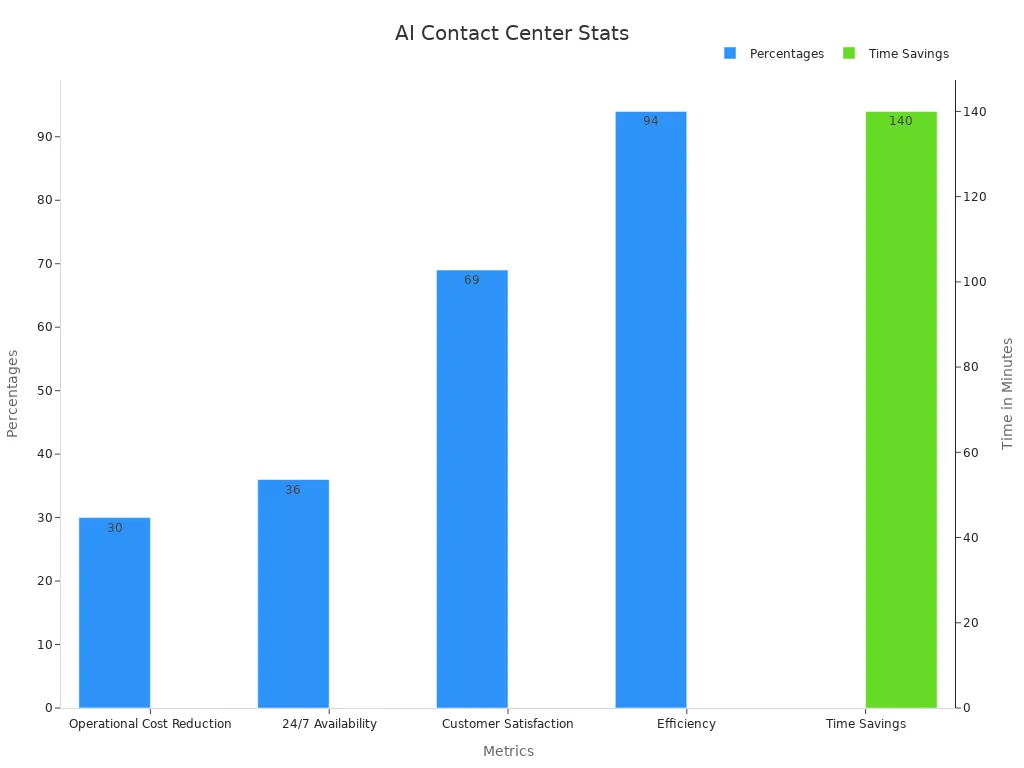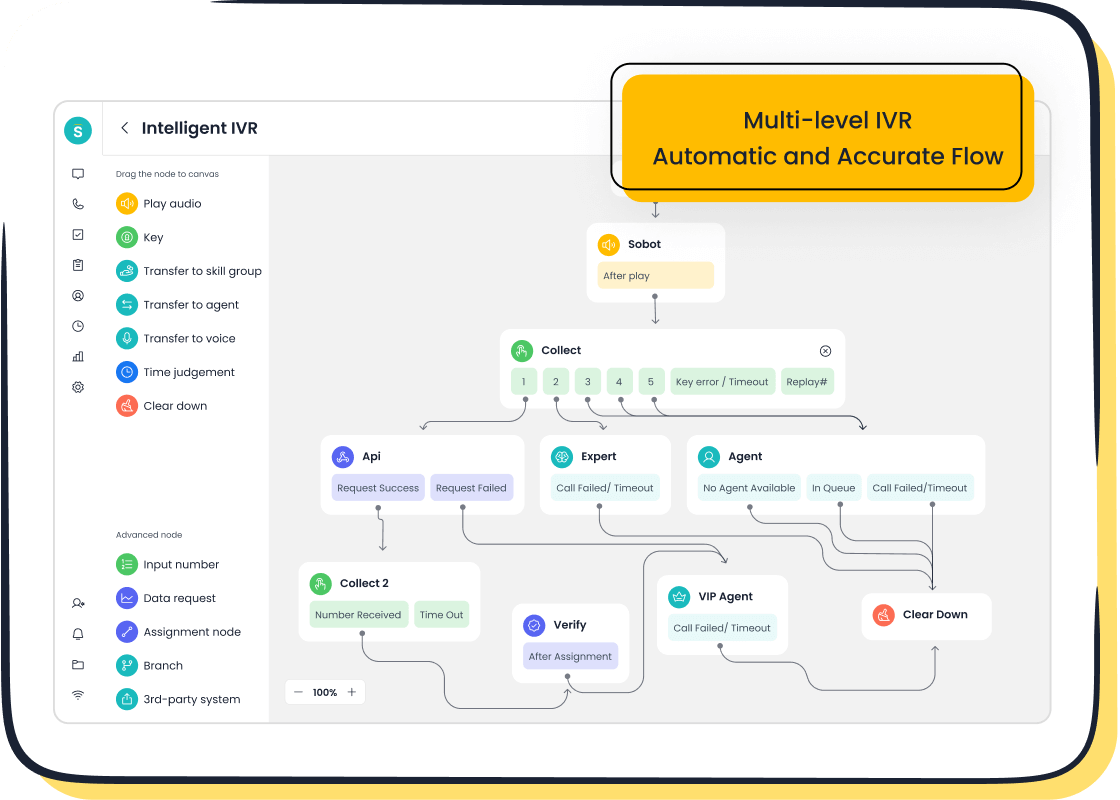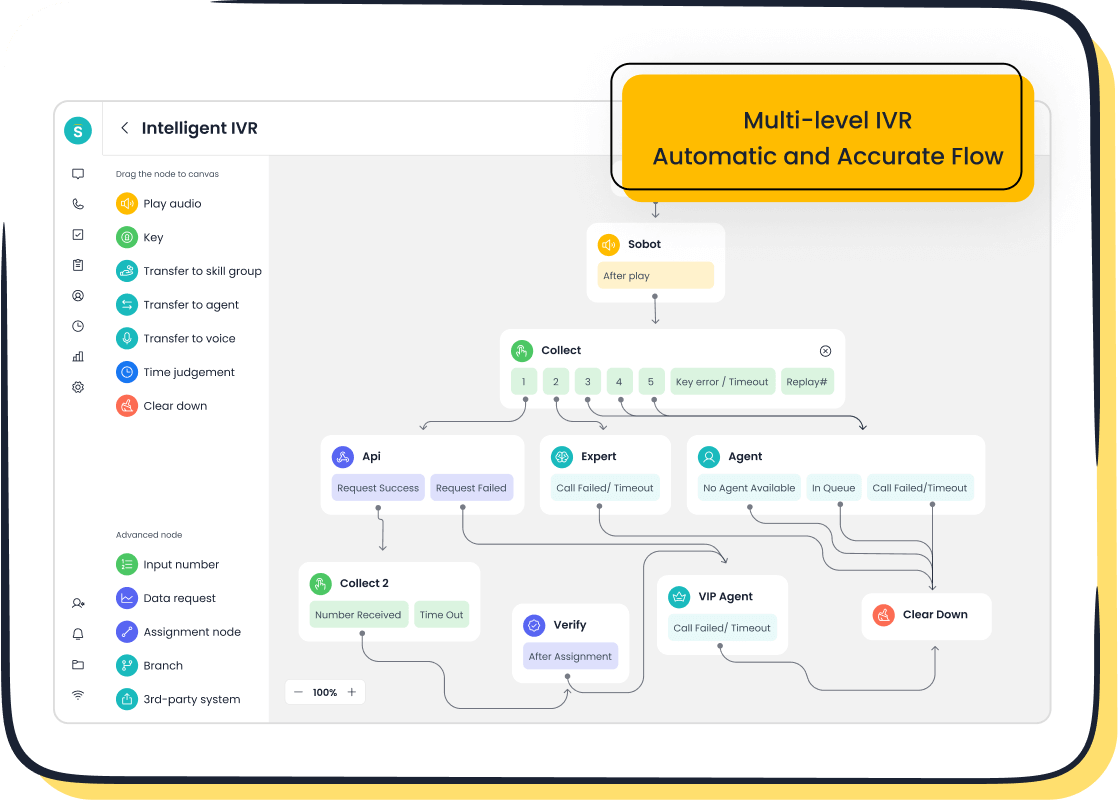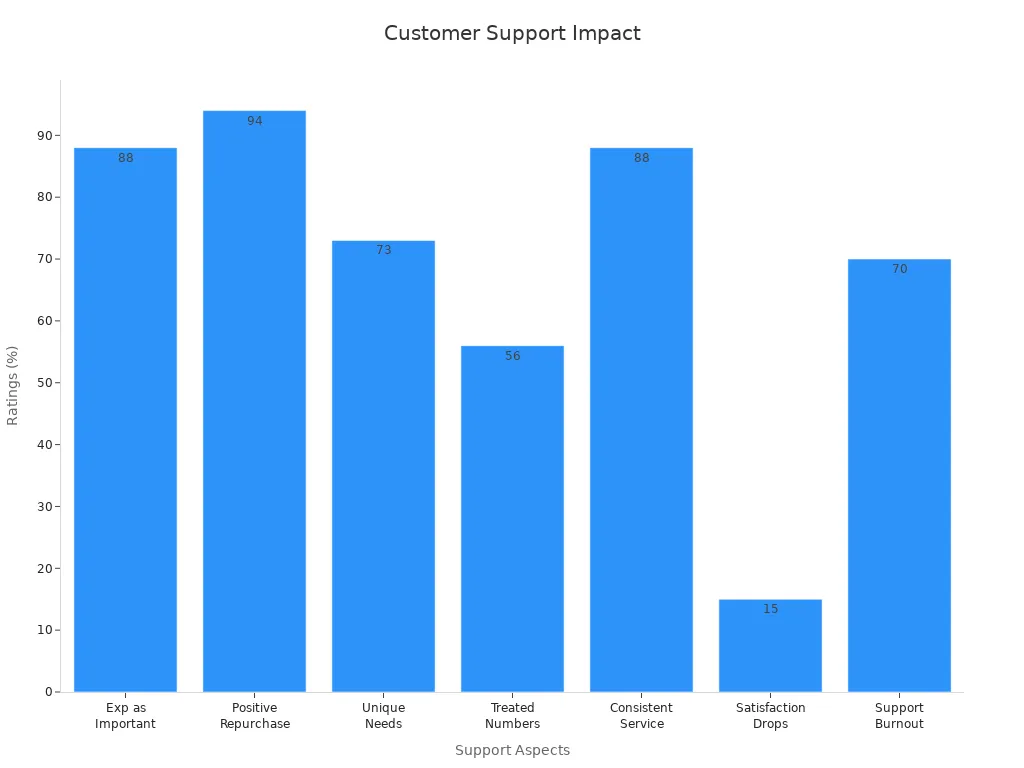Cloud Contact Center Reviews to Guide Your Choice

Customer service has evolved into a fast-paced, technology-driven field. You need tools that keep up. Cloud contact centers have become essential for businesses to meet rising expectations. They offer flexibility, scalability, and AI-powered solutions. Did you know 66% of call centers now use cloud-based systems? Reviews and ratings can help you choose the right platform. Sobot, for example, provides advanced tools to enhance customer interactions. With these insights, you can make informed decisions and improve customer satisfaction.
Understanding Cloud Contact Centers

What Are Cloud Contact Centers
Imagine a contact center that doesn’t rely on bulky hardware or a fixed location. That’s what cloud contact centers are all about. They operate entirely over the Internet, allowing businesses to manage customer service operations from anywhere. All you need is a stable connection and basic workstations. These centers are designed to handle customer interactions across multiple channels, like phone, email, chat, and social media, all from one platform.
What makes them stand out? Their flexibility and scalability. Unlike traditional systems, cloud contact centers can quickly adapt to your business needs. Whether you’re a small startup or a global enterprise, these solutions grow with you. Plus, they’re cost-efficient. You don’t have to invest in expensive hardware or maintenance. Instead, you pay a subscription fee, making it easier to manage your budget.
| Characteristic | Description |
|---|---|
| Internet-based infrastructure | Operates entirely over the Internet, requiring only basic workstations and a stable connection. |
| Scalability | Can quickly adjust to changing call volumes without physical infrastructure expansion. |
| Cost efficiency | Reduces upfront costs by eliminating the need for on-site hardware and offering a subscription model. |
| Flexibility | Enables remote access for agents, broadening talent pools and allowing for better workforce management. |
| Rapid deployment | Faster and less complex setup compared to on-premise systems, with quick updates from service providers. |
| Integration capabilities | Seamless integration with CRM systems and other applications enhances operational efficiency. |
| Disaster recovery | Built-in redundancy and recovery capabilities managed by the service provider. |
| Security | Robust security measures and compliance certifications are typically included. |
| Global reach | Supports consistent service delivery across multiple regions, crucial for international operations. |
Key Benefits for Businesses
Cloud contact centers bring a host of benefits that can transform your customer service operations. First, they offer advanced features like IVR (Interactive Voice Response) and ACD (Automatic Call Distribution). These tools help you manage calls efficiently, ensuring customers get the help they need faster. Omnichannel support is another game-changer. It lets you connect with customers on their preferred platforms, whether it’s social media, email, or live chat.
Analytics is another big win. With cloud-based systems, you gain access to robust reporting tools. These provide insights into customer interactions, helping you make data-driven decisions. For example, GANT Travel improved scalability and service quality while cutting IT costs by adopting a cloud solution. Rapid deployment is another perk. You can set up these systems quickly without disrupting your existing services.
| Benefit | Description |
|---|---|
| Features | Cloud-based contact centers include IVR, ACD, and omnichannel support, enhancing customer satisfaction and response times. |
| Analytics | Robust analytics and reporting capabilities provide insights into customer interactions, aiding data-driven decisions. |
| Rapid Deployment | Cloud solutions can be implemented quickly without disrupting existing services, allowing for fast operational readiness. |
| Integration | Seamless integration with existing systems enables personalized customer experiences through relevant data analysis. |
Why Cloud Contact Centers Are Essential for Customer Success
Your customers expect fast, personalized, and seamless service. Cloud contact centers make this possible. They offer omnichannel support, ensuring customers can reach you on their terms. Whether it’s a quick chat on social media or a detailed phone call, these systems keep everything connected. Real-time analytics also play a crucial role. They give you immediate insights into service quality, helping you address issues before they escalate.
AI integration is another standout feature. It automates repetitive tasks, freeing up your agents to focus on more complex customer needs. For instance, a financial institution saved $10 million by using AI for automated self-service. CRM integration takes things a step further by providing context during interactions. This means your agents can offer personalized solutions, boosting customer satisfaction.
| Feature | Impact on Customer Success |
|---|---|
| Omnichannel support | Ensures seamless interactions across all platforms. |
| Real-time analytics | Provides immediate insights to improve service quality. |
| AI integration | Automates tasks, allowing agents to focus on personalized service. |
| CRM integration | Enhances personalized service by providing context during interactions. |
The numbers speak for themselves. The global cloud-based contact center market was valued at $20.96 billion in 2023 and is expected to grow to $157.08 billion by 2032. This rapid growth highlights how essential these systems have become for businesses aiming to enhance customer success.
Must-Have Features in Cloud Based Contact Center Software
Integration with CRM Systems like Salesforce Service Cloud
If you want your contact center software to truly shine, integration with CRM systems like Salesforce Service Cloud is a must. Why? It bridges the gap between customer interactions and your business data, creating a seamless experience for both your agents and customers. Imagine this: your agent answers a call, and with just one click, they can access the customer’s purchase history, preferences, and past interactions. That’s the power of integration.
Here’s how you can make it work:
- Identify your business needs and the features you want to integrate.
- Choose a compatible CTI (Computer Telephony Integration) adapter for your call center software.
- Set up and configure the adapter for secure data exchange.
- Customize Salesforce layouts to include call center controls.
- Map and synchronize data to ensure consistency.
- Test the system to verify functionality.
- Train your team to use the new tools effectively.
- Deploy the integration and monitor its performance.
- Regularly maintain and update the system for smooth operations.
Salesforce Service Cloud stands out because of its ease of configuration, robust app marketplace, and comprehensive functionality. These features make it a top choice for businesses looking to enhance their cloud based contact center software.
Scalability and Flexibility for Growing Businesses
Your business isn’t static, so why should your call center software be? Scalability and flexibility are essential features for any growing business. Cloud based contact center software allows you to adapt to changing demands effortlessly. Whether you’re handling a seasonal surge or expanding into new markets, these systems scale up or down without breaking a sweat.
For example, during peak periods, scalable platforms dynamically allocate resources to manage high call volumes. This ensures smooth operations without long-term commitments. Plus, the flexibility of cloud solutions means you can connect with customers across various platforms—email, chat, or social media—all from one interface. This omnichannel communication capability is a game-changer for businesses aiming to deliver consistent service.
AI and Automation Capabilities
AI and automation aren’t just buzzwords—they’re transforming the way businesses handle customer interactions. With AI-powered tools, your contact center software can automate repetitive tasks, like answering FAQs or routing calls, freeing up your agents to focus on complex issues. The result? Happier customers and more productive agents.
Take a look at these stats:
| Statistic | Finding |
|-----------|---------|
| Operational Cost Reduction | 30% reduction for telecom companies |
| 24/7 Availability | 36% of experts highlight AI's role |
| Time Savings | Average daily time saving of 2 hours and 20 minutes using chatbots |
| Customer Satisfaction | 69% report improved consumer service |
| Efficiency | 94% productivity boost for CS specialists |
AI also improves customer satisfaction by offering 24/7 availability and personalized service. Whether it’s a chatbot answering queries or an AI-driven voice assistant, these tools make your inbound call center more efficient and customer-friendly.
Omnichannel Support for Seamless Customer Communication
Today’s customers expect to reach you on their terms, whether it’s through a phone call, email, or social media. That’s where omnichannel support comes in. It ensures all your communication channels are connected, providing a seamless experience for your customers.
However, many businesses struggle with challenges like correlating omnichannel records or identifying customers across platforms. Cloud based contact center software solves these issues by unifying all interactions in one place. This not only improves customer satisfaction but also boosts your team’s efficiency. With omnichannel communications management, you can track every interaction, follow up effectively, and deliver a consistent experience across all touchpoints.

By adopting omnichannel communication, you’re not just meeting customer expectations—you’re exceeding them.
Comparing Top Cloud Contact Center Services

Overview of Leading Providers
When it comes to cloud contact center services, the market is filled with options. Each provider brings unique strengths to the table, making it essential to evaluate them based on your business needs. Some of the leading names in the industry include:
- RingCentral Inc.: Known for its robust communication tools and scalability.
- Genesys Telecommunications Laboratories Inc.: Offers advanced AI-driven solutions.
- Five9 Inc.: Focuses on ease of use and omnichannel capabilities.
- NICE inContact: Excels in real-time analytics and customer support.
- 8X8 Inc.: Provides cost-effective solutions for small to medium-sized businesses.
These providers stand out for their features like omnichannel support, intelligent routing, and real-time analytics. For example, Dialpad is praised for its unified communications and seamless usability across devices. Whether you're looking for scalability or AI integration, these companies offer solutions tailored to different industries and business sizes.
| Provider Name |
|---|
| RingCentral Inc. |
| Genesys Telecommunications Laboratories Inc. |
| Five9 Inc. |
| NICE inContact |
| 8X8 Inc. |

Unique Features of Sobot Voice/Call Center
Sobot's Voice/Call Center stands out as one of the best contact center software options available today. It combines advanced technology with user-friendly design to deliver exceptional results. Here’s what makes it unique:
- Intelligent IVR: Customize greetings, build menus, and route calls effortlessly with a drag-and-drop interface.
- AI-Powered Voicebot: Automates repetitive tasks and recognizes customer intent for faster resolutions.
- Unified Workspace: Agents can manage calls and access customer data from a single platform.
- Global Reach: With phone numbers available worldwide, Sobot supports businesses with international operations.
- 99.99% Uptime: Ensures reliable service with minimal disruptions.
For example, Samsung implemented Sobot's solution and achieved a 30% increase in agent efficiency. The platform's seamless integration with CRM systems like Salesforce Service Cloud allows agents to provide personalized service, enhancing customer satisfaction. Whether you're a small business or a global enterprise, Sobot's call center software adapts to your needs.
Pricing Models and Cost Considerations
Understanding pricing models is crucial when comparing top cloud-based contact center software. Most providers offer flexible options to suit different budgets and usage patterns. Here’s a breakdown:
| Pricing Model | Description | Cost Considerations |
|---|---|---|
| On-Demand | Pay for what you use without upfront costs. | Variable costs based on resource consumption. |
| Reserved | Commit to a certain capacity for a lower rate. | Potential termination fees if usage changes. |
| Preemptible | Lower cost options that can be interrupted. | Risk of service interruption and associated costs. |
While these models offer flexibility, hidden costs can catch you off guard. For instance, egress fees for data leaving the provider's network or additional charges for technical support can add up. Regional pricing variations also play a role, especially for businesses with global operations. Sobot, however, simplifies this with its economic SaaS rental model, offering transparent pricing and no hidden fees.
User Feedback and Ratings
User reviews and ratings provide valuable insights into the performance of cloud contact center services. Most users highlight the following benefits:
- Ease of Use: Platforms like Sobot are praised for their intuitive interfaces.
- Scalability: Businesses appreciate the ability to scale up or down based on demand.
- Omnichannel Support: Seamless integration across channels enhances customer experience.
However, some challenges include the learning curve for new users and occasional service interruptions. Despite these, trends show increasing customer satisfaction, especially with providers that offer robust features like real-time analytics and AI integration. Sobot, for instance, has received high ratings for its reliability and comprehensive feature set, making it a preferred choice for businesses across industries.
Insights from User Reviews
Common Pros of Cloud Contact Centers
When you dive into user reviews, certain advantages of cloud contact centers stand out. One of the biggest perks is their flexibility. You can scale your operations up or down depending on your business needs. This is especially helpful during peak seasons or unexpected surges in demand. Another common theme in user feedback is the ease of integration. Many users appreciate how seamlessly call center software connects with tools like CRM systems, making customer service more efficient.
Omnichannel support is another highlight. Customers love being able to reach you through their preferred channels, whether it’s email, chat, or social media. This feature ensures a consistent experience across platforms. Real user experiences also show that businesses benefit from advanced analytics. These tools help you track performance and improve customer satisfaction over time. Plus, the cost-effectiveness of cloud contact centers is a major win. You don’t need to invest in expensive hardware, which makes these solutions accessible for businesses of all sizes.
Challenges and Cons Reported by Users
While cloud contact centers offer many benefits, they’re not without challenges. User reviews often mention the pressure to meet rising customer expectations. People want fast, seamless service, and delays can lead to frustration. High call volumes sometimes result in longer wait times, which can affect customer satisfaction. Another issue is the demand for personalized service. Generic responses, especially from AI, can leave customers feeling undervalued.
Some users also report difficulties integrating advanced technologies like AI into existing systems. This can slow down operations and create inefficiencies. Language barriers are another concern. Misunderstandings between agents and customers can lead to poor experiences. Additionally, maintaining agent morale is crucial. Burnout and high turnover rates are common in customer service roles, making it essential to provide proper training and support.
Did you know? 60% of consumers worry that AI might make it harder to reach a human, and 42% fear it could provide incorrect answers. These concerns highlight the importance of balancing automation with human interaction.
Trends in Customer Satisfaction
Customer satisfaction trends reveal a growing focus on AI, automation, and analytics. Businesses are increasingly adopting these technologies to enhance customer service. For example, 42.9% of B2B companies and 49.1% of B2C companies now use AI in their operations. Omnichannel communication is also gaining traction, with 42.4% of B2B and 45.8% of B2C businesses prioritizing digital integration.
Interestingly, the Global Contact Center Satisfaction Index shows that private sector satisfaction levels have consistently outperformed the government sector. However, a convergence in satisfaction levels was observed in 2022, indicating improvements across the board. These trends suggest that businesses are investing more in tools and strategies to boost client satisfaction and stay competitive.
Choosing the Best Cloud Contact Center Service
Evaluating Costs and Budget
Choosing the right call center software starts with understanding your budget. You need tools that help you track and optimize spending. Cloud cost management tools are a great place to start. They show where your money goes and whether you're getting a good return on investment. Look for tools with features like real-time monitoring, cost visibility, and optimization recommendations. These make it easier to plan and stick to your budget.
Here’s a quick checklist for evaluating costs:
- Use tools that offer detailed cost allocation reports.
- Monitor spending in real time to avoid surprises.
- Look for budgeting capabilities to forecast expenses.
- Choose software with transparent pricing models to avoid hidden fees.
Sobot’s economic SaaS rental model simplifies budgeting. It offers clear pricing without unexpected costs, making it a reliable choice for businesses of all sizes.
Assessing Reliability and Uptime
Reliability is non-negotiable when it comes to customer service. You need a platform that guarantees high uptime and consistent performance. Most providers offer Service Level Agreements (SLAs) to ensure reliability. These agreements promise a minimum uptime, often 99.99%, and even refunds if the service falls short.
| Uptime Guarantee | Infrastructure Features |
|---|---|
| 99.99% | Redundant data centers, failover mechanisms, and robust cloud application designs. |
Sobot’s call center software excels in this area, offering a 99.99% uptime backed by a global network. This ensures your customer service teams stay connected and productive, no matter what.
Importance of Customer Support and Training
Customer support isn’t just about answering calls—it’s about empowering your agents. Training programs play a huge role in this. Well-trained agents handle issues faster and reduce repeat calls, boosting customer satisfaction. For example, satisfaction drops by 15% when customers have to call back about the same problem.
| Statistic | Value |
|---|---|
| Customers expecting consistent interactions across departments | 88% |
| Agents less likely to feel burnout with support | 70% |
| Customers likely to make another purchase after a positive experience | 94% |
Sobot provides ongoing training and support to ensure your agents feel confident and capable. This reduces burnout and improves service quality, making your customer service teams more effective.

Matching Features to Business Needs
Every business has unique needs, so your call center software should offer customizable features. For example, a Canadian telecommunications company improved its Net Promoter Score by 149% after switching to a cloud platform with integrated functionalities. The new system automated post-call surveys and boosted first-call resolution rates by 93%.
Here’s how to match features to your needs:
- Identify your pain points, like outdated systems or high call volumes.
- Look for software with self-service options, like IVR, to reduce agent workload.
- Choose platforms that integrate with tools like Salesforce Service Cloud for better case management.
Sobot’s omnichannel solution adapts to various industries, offering tools like AI-powered voicebots and global telephony support. Whether you’re in retail or finance, Sobot’s features align with your goals.
Choosing the right call center software can transform your customer service. It’s about more than just tools—it’s about empowering your team and delighting your customers. Companies that focus on analytics, employee empowerment, and the customer journey see better results. Sobot’s solutions offer everything you need to elevate your customer service experience.
- Key Takeaways:
- Customer Journey: Optimize KPIs like quality scores and resolution rates.
- Employee Empowerment: Use analytics to boost agent productivity.
- Business Intelligence: Gain insights to understand customers better.
Ready to take your customer service to the next level? Explore Sobot’s call center software today.
FAQ
What is call center software, and why is it important?
Call center software helps you manage customer interactions across multiple channels. It improves efficiency, enhances customer satisfaction, and supports your team with tools like automation and analytics.
How does call center software improve customer service?
It streamlines communication by integrating channels like phone, email, and chat. It also provides tools like real-time analytics and AI to enhance customer experiences and agent productivity.
Can call center software scale with my business?
Yes! Call center software adapts to your needs. Whether you're a small business or a global enterprise, it scales up or down to match your growth.
See Also
Best Reviewed Cloud Contact Center Services For 2024
Leading Contact Center Solutions Evaluated For 2024
Comprehensive Guide To Omnichannel Call Center Tools
